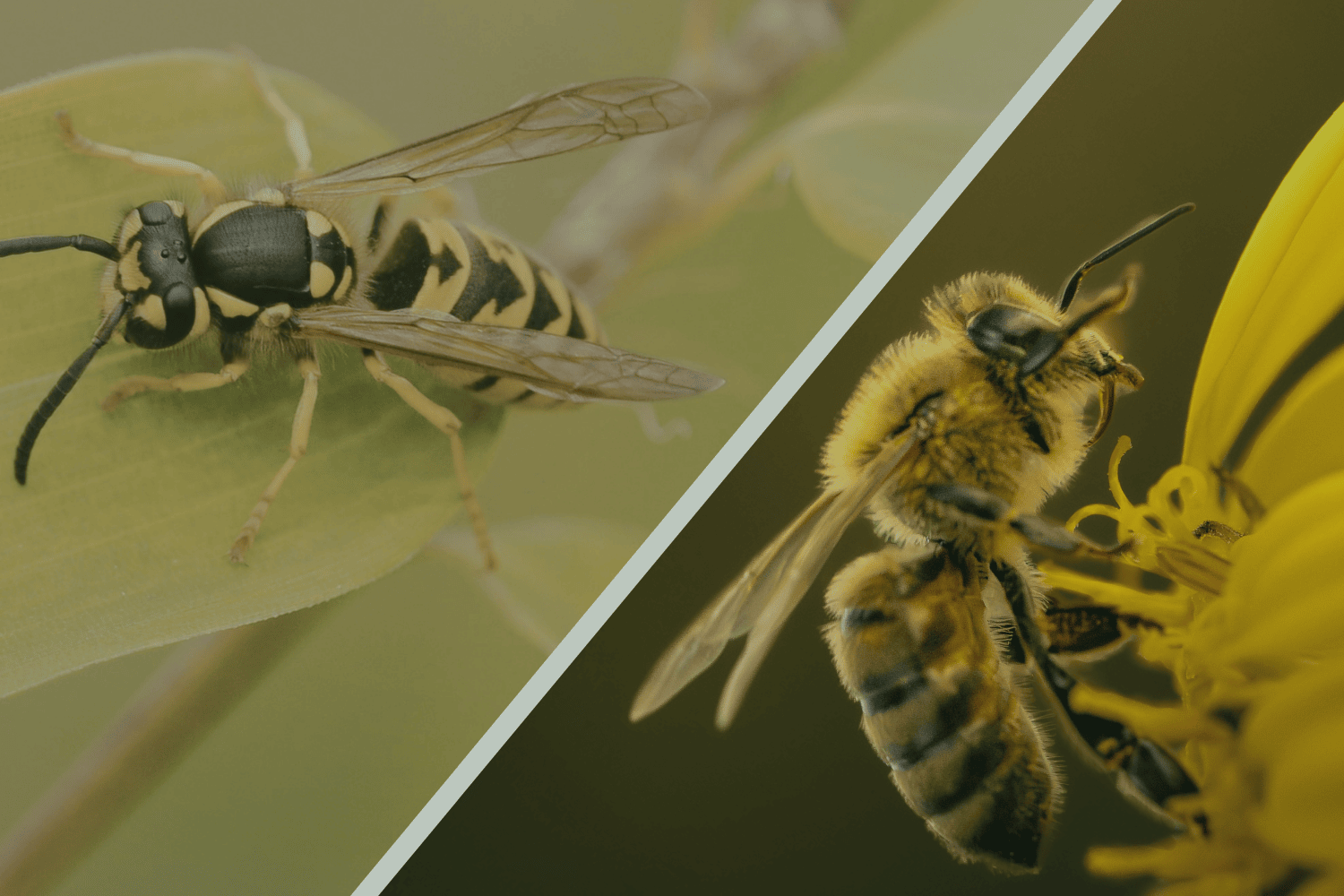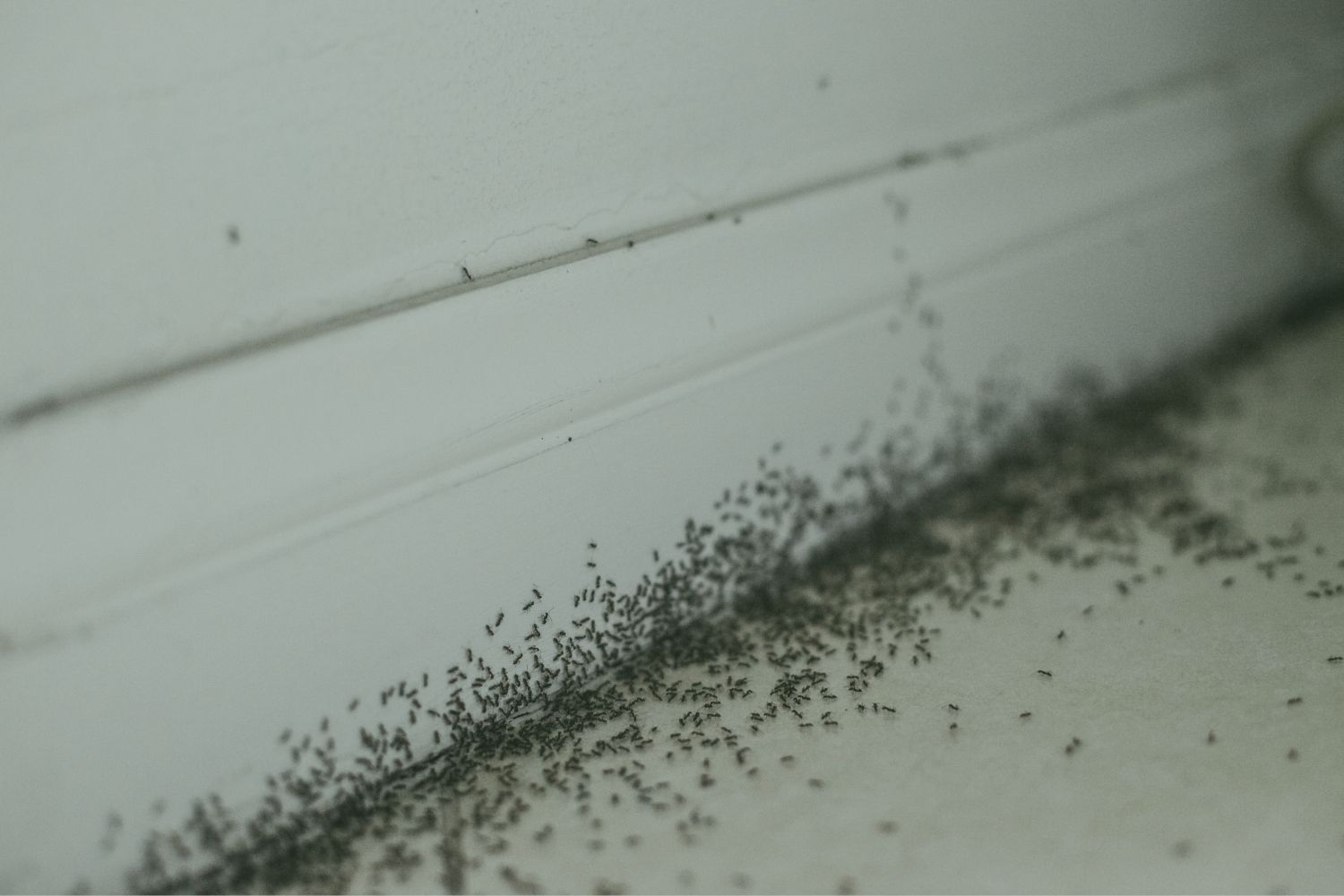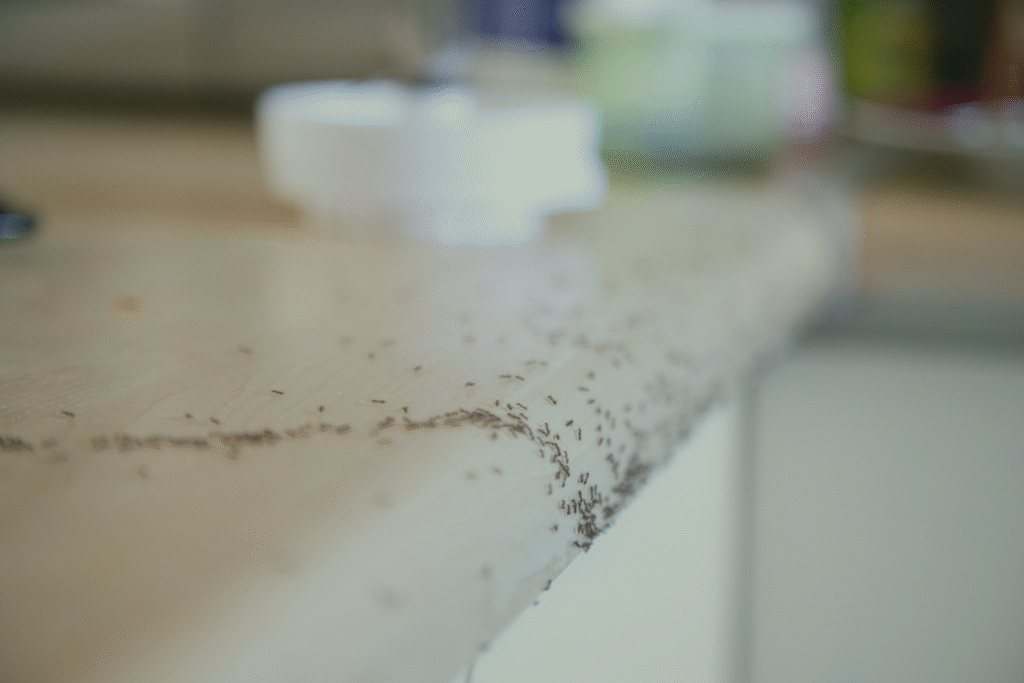
If you’ve spotted tiny ants marching across your kitchen counters or bathroom sinks, you’re not alone. Ants are one of the most common household pests in the U.S., and according to PestWorld, they’re the #1 nuisance pest reported by homeowners.
The fastest way to get rid of tiny ants is to remove what attracts them, seal the cracks they use to get inside, and use baits that target the colony rather than sprays that only kill the ants you see. But if ants keep coming back, professional pest control is the surest way to stop them for good.
What Kind of Tiny Ants Are Common in Washington Homes?
Not all ants are the same, and understanding which type you’re dealing with makes it easier to get rid of them quickly. In Olympia, Lacey, and Centralia, Washington, several species of small ants are especially common:
- Odorous house ants – These are the tiny brown ants most people notice in kitchens. They move in long, organized trails and smell like rotten coconut when crushed. They’re drawn to sweets and can create large colonies that spread through walls and floors.
- Pavement ants – Usually found nesting outside in soil, under sidewalks, or between cracks in driveways. They often make their way inside through foundation gaps in search of food.
- Moisture ants – Smaller yellowish ants that thrive in damp or decaying wood. If you find these ants inside, it may be a sign of a moisture problem or wood rot in your home.
- Sugar ants – A general term used by homeowners for various small ant species that are especially attracted to sugary foods.
Each type behaves differently, so professional identification is often the quickest way to figure out what you’re up against. Bigfoot Pest Management helps homeowners in Washington quickly identify the species so treatment can be effective right away.
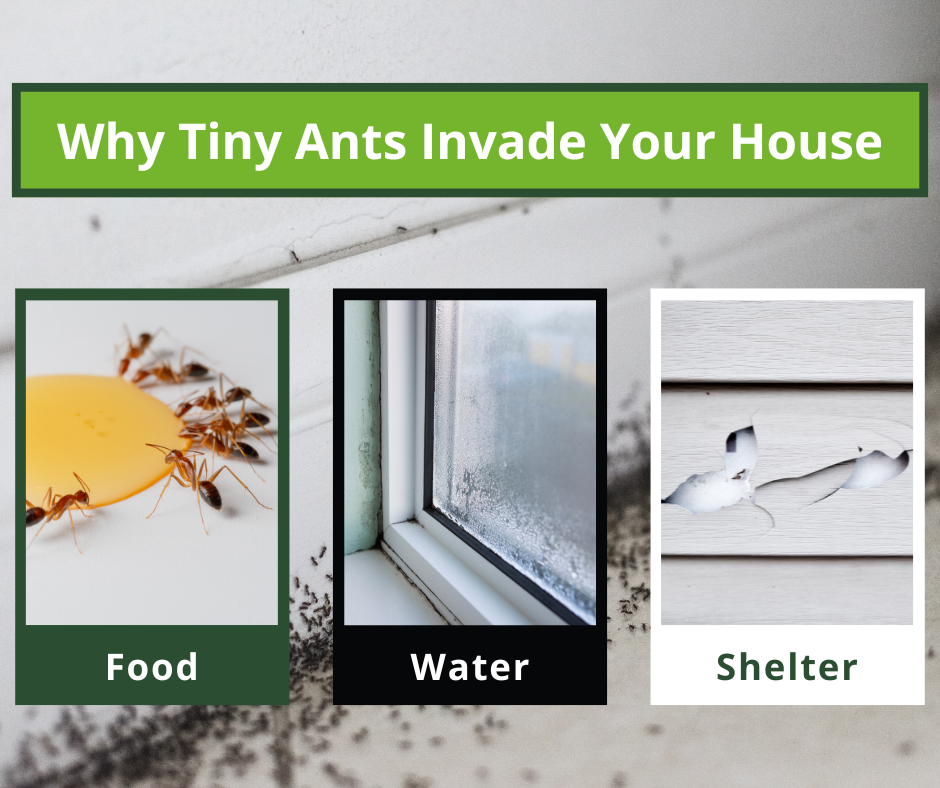
Why Tiny Ants Invade Your House
Ants don’t randomly show up inside homes. They’re looking for three essentials: food, water, and shelter.
- Food sources: Tiny ants have a strong sense of smell and are attracted to even the smallest crumbs. Sweets, grease, pet food, and open pantry items are top targets.
- Water sources: Ants need moisture to survive. Leaky faucets, condensation under sinks, or damp wood around windows are common hotspots.
- Entry points: Ants slip inside through cracks in foundations, gaps around doors and windows, holes in siding, and even utility lines.
Washington’s climate adds to the problem. With frequent rain and damp conditions, ants are more likely to find water sources and thrive indoors. Even a small leak in your crawl space or around your foundation can create an invitation for a colony to move in.
Health and Property Concerns With Tiny Ants
While tiny ants aren’t usually harmful in the way that termites or rodents are, they can still cause headaches for homeowners:
- Food contamination: Ants crawl across floors, trash, and outdoor areas before ending up in your kitchen. Once inside, they can contaminate food and surfaces, which may spread bacteria.
- Property impact: Pavement ants can build nests in foundations, while moisture ants are often a sign of wood damage from leaks. These issues, if ignored, can become costly.
- Large colonies: Odorous house ants, in particular, form massive colonies with multiple queens. Killing the ants you see doesn’t solve the problem; the colony can quickly repopulate.
Ignoring ants may not seem urgent, but infestations grow fast. What starts as a few ants on the counter can become hundreds within days if food and water sources remain available.
How to Get Rid of Tiny Ants in Your House Fast
Here’s a step-by-step approach to handling ant infestations:
- Clean and remove attractants
Ants leave behind pheromone trails that help others find food. Wiping down counters with vinegar or soapy water removes these trails and prevents reinforcements from arriving. Sweep floors, vacuum crumbs, and keep pet food bowls clean. Store food in sealed containers, especially sweets and cereal. - Seal entry points
Inspect baseboards, window frames, and doors for gaps. Caulk cracks in your foundation and fix torn screens. Even small gaps are enough for ants to enter. - Try DIY solutions
- Ant baits: These are more effective than sprays because ants carry the bait back to the colony, wiping out the source.
- Natural cleaners: Vinegar or lemon juice can disrupt ant trails.
- Soapy water: Spraying ants with soapy water kills them quickly and removes their scent trails.
- Call a professional if ants keep coming back
DIY methods may reduce the problem temporarily, but they rarely eliminate the entire colony. Professional pest control treatments are designed to target colonies directly and stop the infestation fast.
Common Mistakes Homeowners Make With Ants
Many homeowners unintentionally make ant problems worse by:
- Using only sprays – Sprays kill the ants you see, but don’t address the colony. This often scatters the colony, making the infestation harder to track.
- Ignoring moisture issues – Ants love damp environments. Leaks under sinks, crawl space condensation, or clogged gutters can keep attracting them.
- Leaving out food overnight – Even a dog bowl or a few crumbs are enough to fuel a colony.
- Waiting too long to act – Ant infestations don’t go away on their own. The longer you wait, the bigger the colony becomes.
How to Prevent Tiny Ants From Coming Back
Once you’ve eliminated ants, prevention is key to keeping them away.
- Stay on top of cleaning – Wipe counters daily, rinse dishes right away, and store pantry items in airtight containers.
- Maintain your yard – Trim bushes, trees, and vegetation that touch your home. Ants use these as bridges to get inside.
- Control moisture – Fix leaks, clean gutters, and make sure your crawl space or basement is well-ventilated.
- Schedule ongoing pest control – Regular treatments and effective pest control create a barrier around your home, preventing ants and other pests from re-entering.
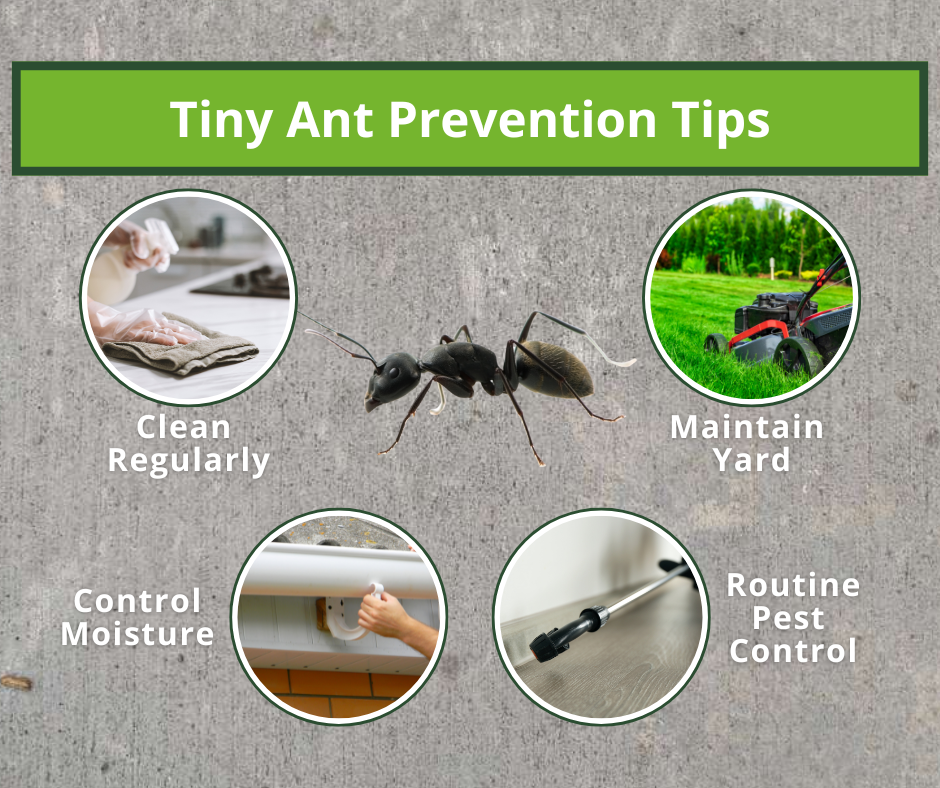
Related Questions
What’s the fastest way to kill tiny ants in the kitchen?
The fastest option is ant bait stations. Place them where ants are trailing. The ants carry bait back to the nest, wiping out the colony faster than sprays.
Do store-bought ant sprays actually work?
They kill on contact but don’t completely get rid of the colony. Sprays are fine for quick relief, but won’t stop the problem long term.
How do I know if I have carpenter ants instead of tiny sugar ants?
Carpenter ants are much larger, usually black or red, and may leave behind sawdust-like debris. If you notice this, it’s best to call a professional immediately.
Are tiny ants dangerous to my family or pets?
Most small ants in Washington aren’t harmful, but they can contaminate food and spread bacteria. They’re more of a nuisance than a direct health risk.
When should I call a pest control professional for ants?
If ants return after your DIY attempts, or if you notice large numbers in multiple rooms, it’s time to call Bigfoot Pest Management. Professionals can eliminate colonies quickly and prevent them from coming back.
Conclusion
Tiny ants may be small, but they cause big frustration for Washington homeowners. Now you know how to get rid of tiny ants in your house fast: clean up food sources, seal entry points, and use effective baits instead of sprays. Still, the fastest and most reliable way to eliminate them is professional pest control.
For local expertise and fast results, trust Bigfoot Pest Management. We’ve helped countless Washington homeowners stop ant infestations quickly and keep their homes pest-free.
Honey Bee vs Yellow Jacket: Which One Is in Your Yard?
If you have noticed stinging insects flying around your yard in Olympia, you are not alone. As temperatures rise across Thurston County, activity increases around…
How Moisture Problems Invite Ants and Other Pests
In Olympia and throughout the South Sound, moisture is part of everyday life. Between frequent rainfall, cool temperatures, and shaded properties, homes often stay damp…




